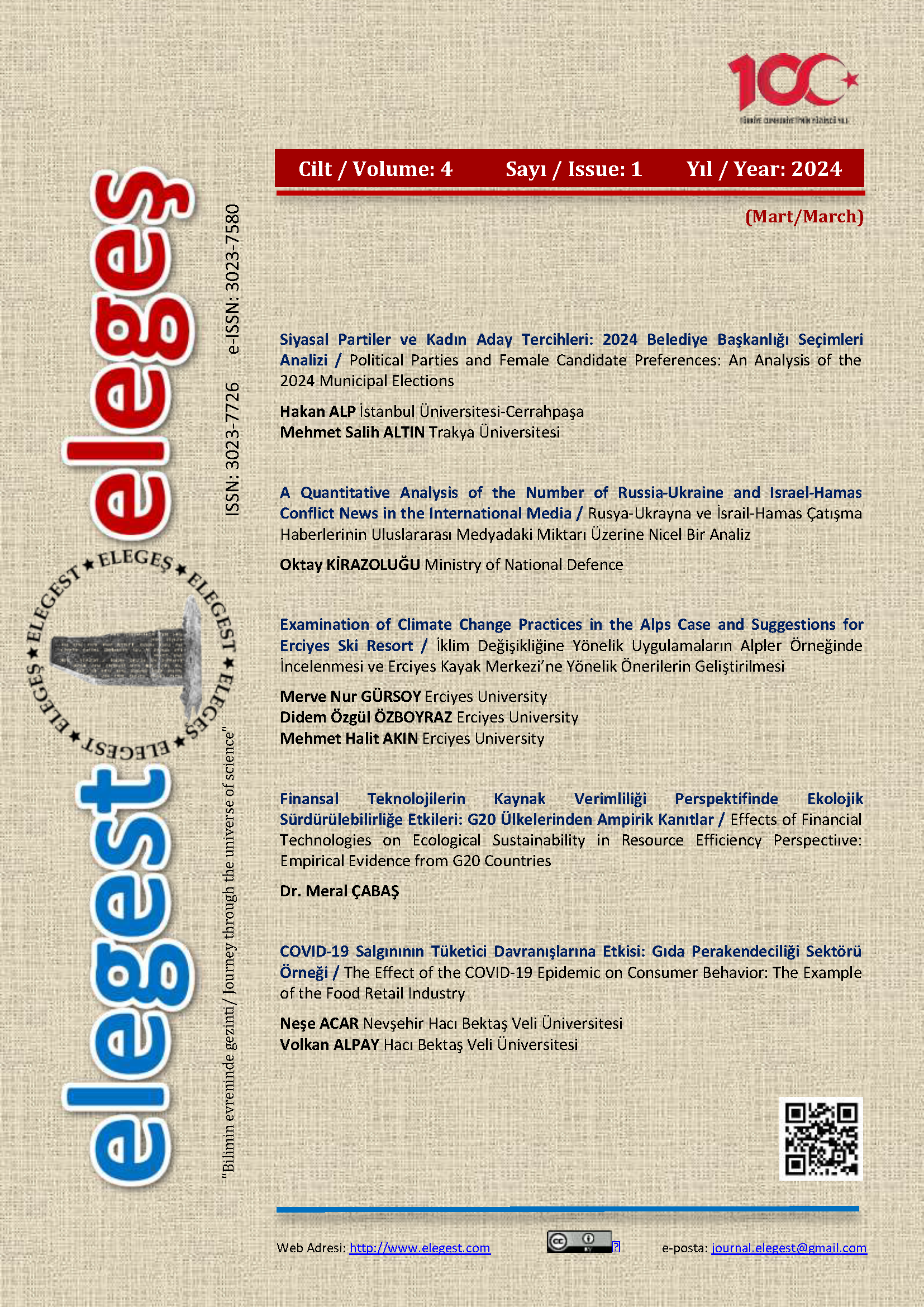Political Parties and Female Candidate Preferences: An Analysis of the 2024 Municipal Elections

Published 31.03.2025
Keywords
- Gender Equality,
- Political Representation,
- Woman,
- Political Election
- Toplumsal Cinsiyet Eşitliği,
- Siyasal Temsil,
- Kadın,
- Siyasal Seçim
How to Cite
Copyright (c) 2025 Hakan Alp- Mehmet Salih Altın (Yazar)

This work is licensed under a Creative Commons Attribution-NonCommercial-NoDerivatives 4.0 International License.
How to Cite
Abstract
This study examines the inclination of political parties to nominate female candidates for mayoral positions in the local municipal elections scheduled for March 31, 2024. The objective of this research is to address the scarcity of female candidates and the representation issue, shedding light on various problems this situation creates for women. The paper argues that the underrepresentation of women introduces a masculine perspective into policy-making processes, encourages alienation from women's issues, and reinforces traditional gender roles. This scenario significantly hinders the achievement of gender equality and leads to a lack of women's voices in comprehensive policy-making.
This study adopts a quantitative analysis methodology, utilizing official electoral statistics to scrutinize the gender composition of candidates in the 2024 municipal elections. It aims to shed light on the nomination strategies of political parties regarding female candidates, within the context of societal gender roles and representation. The analysis involves a comparative evaluation of the data from previous elections to identify trends and shifts in gender representation among candidates. Additionally, the study explores the impact of political parties' policies on female candidacy and examines the correlation between party ideology and the proportion of female candidates. This approach facilitates a comprehensive understanding of the dynamics influencing female participation in political leadership positions and contributes to the discourse on gender equality in political representation. Our hypothesis suggests that political parties are falling short in nominating female candidates, which poses serious concerns for gender representation. The universe of the study encompasses all political parties and candidates participating in the 2024 local elections. Findings indicate that increasing the number of female candidates could facilitate the adoption of a more inclusive and diverse approach in policy-making processes. Furthermore, the study emphasizes the importance of political representation in achieving gender equality and empowering women within society. This research aims to contribute to the development of strategies to enhance the representation of women in politics.
References
- Arat, Necla. (1986). Kadın sorunu, Say Yayınları.
- Atabey, G. & Hasta, D. (2018). Siyasal katılım, siyasal yeterlik ve toplumsal cinsiyet. Nesne, 6(13), 484-516.
- Ayata, A. (2011). Siyaset ve katılım, toplumsal cinsiyet sosyolojisi, Yıldız Ecevit ve Karkıner, Necla (Ed.), Toplumsal cinsiyet sosyolojisi, (Eskişehir: Anadolu Üniversitesi Yayınları): 65- 78.
- Berktay, F. (1996). Tek tanrılı dinler karşısında kadın, Metis Yayınları.
- Bhasini, K. (2003). Toplumsal cinsiyet bize yüklenen roller (Çev. Kader Ay), Kadınlarla Dayanışma Vakfı Yayınları.
- Bourdieu, P. (2015). Eril tahakküm. Çev. Bediz Yılmaz, Bağlam Yayıncılık.
- Günay, G. & Bener, Ö. (2011). Kadınların toplumsal cinsiyet rolleri çerçevesinde aile içi yaşamı algılama biçimleri. Türkiye Sosyal Araştırmalar Dergisi, 15(3), 157-171.
- Marini M. M. (1990). Sex and gender: what do we know?, Sociological Forum, S.5(1), Ss.95-120.
- Metin, A. (2008). Kimliğin toplumsal inşası ve geleneksel kadın kimliğinin aktarımı. Çankırı Karatekin Üniversitesi Sosyal Bilimler Enstitüsü̈ Dergisi, 2(1), 74- 92.
- Meulenbent, A. (1987). Feminizm ve sosyalizm (Çev. Erman Demirci), Yazın Yayıncılık.
- Pınarcıoğlu N. Ş. (2017). Eril Siyasette Kadın Temsili mi?, Batman Üniversitesi Yaşam Bilimleri Dergisi, 7 (1): 12-24.
- Sakallı Uğurlu, N. (2003). Cinsiyetçilik: kadınlara ve erkeklere ilişkin tutumlar ve çelişik duygulu cinsiyetçilik kuramı. Türk Psikoloji Yazıları, 6(11-12), 1- 20.
- Sancar, S. (2016). Erkeklik: imkânsız iktidar, Metis Yayınları.
- Tekeli, Ş. (1988). Kadınlar için, Alan Yayıncılık.
- Yaşın Dökmen, Z. (2010). Toplumsal cinsiyet- sosyal psikolojik açıklamalar (1.Baskı), Remzi Kitabevi.
- İnternet Kaynakları
- https://acikveri.ysk.gov.tr/anasayfa

